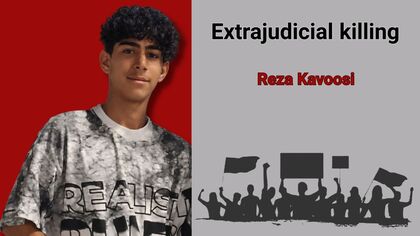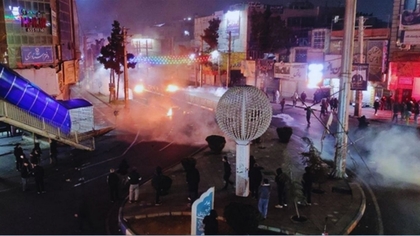For Iran, the sanctions price may be worth paying
15:13 - 30 November 2011

Iran regards its nuclear program as a source of power and prestige and tougher sanctions look unlikely to alter Tehran\'s cost-benefit analysis much despite the economic pain they cause.
Deep mistrust of Western intentions and security concerns in a volatile region where the United States maintains a strong military presence could help explain Iran\'s resolve not to back down and curb nuclear work its foes fear has weapons aims.
That determination may have been further reinforced by the fall in August of Libya\'s Muammar Gaddafi, who agreed in 2003 to abandon efforts to acquire weapons of mass destruction only to be toppled after his people rose up and Western powers turned against him.
Iran is facing a new wave of punitive measures after a United Nations nuclear watchdog report this month lent independent weight to suspicions, rejected by Tehran, that it has been developing a capability to make atomic bombs.
\"Iran\'s nuclear program is motivated by regime survival,\" said international policy analyst Alireza Nader of RAND Corporation, a U.S.-based research group.
\"It appears the Islamic Republic has made the calculation that a potential nuclear weapons capability is worth the price of sanctions, as long as sanctions do not imperil the regime.\"
If that is the case, the latest push by the United States and its European allies may do little to force a change of course by Iran in the long-running nuclear dispute, which has the potential to trigger a wider conflict in the Middle East.
\"The mere fact that Iran is ready to bear the brunt of increasingly painful sanctions demonstrates that they are entrenching themselves in a siege mentality, ready for a showdown if need be,\" said Bruno Tertrais, a senior research fellow at France\'s Strategic Research Foundation think tank.
European Union foreign ministers meet on Thursday to discuss new sanctions on Tehran, after the United States, Canada and Britain last week announced measures against Iran\'s energy and financial sectors.
Iranian leaders are responding in a characteristically defiant manner to the latest such measures to target the major oil producer, which is already subject to four rounds of U.N. sanctions as well as separate U.S. and European steps.
RESISTING WESTERN \"DOMINANCE\"
In a sign of Iran\'s uncompromising stance, a bill to downgrade ties with London won final legislative approval on Monday, compelling the government to expel Britain\'s ambassador in retaliation for the new sanctions on Tehran.
\"The escalating pressure only increases opposition in Iran to enter dialogue or to retreat from its positions as it would show weakness that they believe could be exploited by the West,\" a senior Western diplomat in the Iranian capital said.
Political power struggles make it \"in practice impossible\" for Iranian leaders to show more flexibility as they would risk being attacked by their domestic rivals, the envoy added.
The United States and its European partners seized on the November 8 report by the International Atomic Energy Agency (IAEA), which said Iran appeared to have worked on designing a nuclear weapon, to try to further isolate the country.
It also sparked renewed speculation that Israel, which sees Iran\'s nuclear program as an existential threat, might launch pre-emptive strikes against its atomic sites.
Iran dismissed the report by the Vienna-based U.N. nuclear watchdog, which also said that secret weapons-relevant research may continue, as based on forged evidence. It says its nuclear program is a peaceful bid to generate electricity.
Iran can draw some comfort from Russian and Chinese opposition to further sanctions against a country with which they share substantial commercial ties, blunting the impact of harsher Western measures.
Iran\'s leaders \"find political gain is being able to survive U.S.-led pressure,\" Mark Fitzpatrick, a director of the International Institute for Strategic Studies think tank, said.
Tehran\'s thinking appears in part shaped by deep-rooted suspicions that its enemies ultimately want the overthrow of the country\'s system of Islamic clerical rule, established after the 1979 revolution that toppled the U.S.-backed shah.
\"Threats of a military option or regime change only reinforce their determination to resist,\" Fitzpatrick said.
Standing up against Western demands offers the conservative leadership a chance to rally nationalist support and distract attention from the economic woes many people are experiencing.
\"The nuclear program has morphed into the ultimate expression of Iran\'s resistance to Western dominance and an \'unjust\' international system,\" said Ali Vaez of the Federation of American Scientists, a Washington-based think tank.
Tightening sanctions also risk, however, fuelling domestic discontent that erupted after a disputed 2009 election and that the authorities used force to suppress.
Whether they \"result in a popular uprising against the government is a matter of speculation which has been prompted by the revolts in North Africa and the Middle East,\" said Mark Hibbs of the Carnegie Endowment for International Peace.
VIRTUAL NUCLEAR POWER?
The United States says the drive it leads to isolate Iran has slowed its nuclear program and that there is still time to persuade it to abandon atomic weapons ambitions.
But despite sanctions and suspected sabotage, Iran is pressing ahead with work that it says is for a planned network of power plants but experts say could also be used for bombs.
Iran\'s current stockpile of low-enriched uranium would be sufficient for at least two nuclear bombs if refined much further and it is preparing to shift its most sensitive enrichment activity to an underground bunker.
Iran\'s nuclear activities are geared toward providing it with the option to build atomic weapons so that \"it can get some perceived security benefits and prestige from being on the cusp of joining the nuclear club,\" said Peter Crail of the Arms Control Association, a U.S.-based research and advocacy group.
Diplomatic efforts to resolve the row have stalled after a fruitless meeting in Istanbul in January between Iranian officials and representatives of the six major powers - the United States, Russia, France, Germany, China and Britain.
Both sides say they are ready to resume talks, but Iran insists it will never suspend uranium enrichment as demanded by repeated United Nations Security Council resolutions.
Its leaders risk looking weak if they retreat but stand to gain \"respect and coercive power that comes along with being a virtual nuclear power\" if they persist, said Henry Sokolski of the U.S.-based Nonproliferation Policy Education Center.
In the search for a possible way forward, the West may have to accept that Iran continues some enrichment, in return for more intrusive IAEA inspections to make sure there are no military links to its program, analysts say.
\"If there is a negotiated solution to this crisis, the outcome would likely be an Iran which is enriching uranium and has gone some of the way toward having a nuclear weapons capability,\" Carnegie\'s Hibbs said.
By Fredrik Dahl (Reuters)
Deep mistrust of Western intentions and security concerns in a volatile region where the United States maintains a strong military presence could help explain Iran\'s resolve not to back down and curb nuclear work its foes fear has weapons aims.
That determination may have been further reinforced by the fall in August of Libya\'s Muammar Gaddafi, who agreed in 2003 to abandon efforts to acquire weapons of mass destruction only to be toppled after his people rose up and Western powers turned against him.
Iran is facing a new wave of punitive measures after a United Nations nuclear watchdog report this month lent independent weight to suspicions, rejected by Tehran, that it has been developing a capability to make atomic bombs.
\"Iran\'s nuclear program is motivated by regime survival,\" said international policy analyst Alireza Nader of RAND Corporation, a U.S.-based research group.
\"It appears the Islamic Republic has made the calculation that a potential nuclear weapons capability is worth the price of sanctions, as long as sanctions do not imperil the regime.\"
If that is the case, the latest push by the United States and its European allies may do little to force a change of course by Iran in the long-running nuclear dispute, which has the potential to trigger a wider conflict in the Middle East.
\"The mere fact that Iran is ready to bear the brunt of increasingly painful sanctions demonstrates that they are entrenching themselves in a siege mentality, ready for a showdown if need be,\" said Bruno Tertrais, a senior research fellow at France\'s Strategic Research Foundation think tank.
European Union foreign ministers meet on Thursday to discuss new sanctions on Tehran, after the United States, Canada and Britain last week announced measures against Iran\'s energy and financial sectors.
Iranian leaders are responding in a characteristically defiant manner to the latest such measures to target the major oil producer, which is already subject to four rounds of U.N. sanctions as well as separate U.S. and European steps.
RESISTING WESTERN \"DOMINANCE\"
In a sign of Iran\'s uncompromising stance, a bill to downgrade ties with London won final legislative approval on Monday, compelling the government to expel Britain\'s ambassador in retaliation for the new sanctions on Tehran.
\"The escalating pressure only increases opposition in Iran to enter dialogue or to retreat from its positions as it would show weakness that they believe could be exploited by the West,\" a senior Western diplomat in the Iranian capital said.
Political power struggles make it \"in practice impossible\" for Iranian leaders to show more flexibility as they would risk being attacked by their domestic rivals, the envoy added.
The United States and its European partners seized on the November 8 report by the International Atomic Energy Agency (IAEA), which said Iran appeared to have worked on designing a nuclear weapon, to try to further isolate the country.
It also sparked renewed speculation that Israel, which sees Iran\'s nuclear program as an existential threat, might launch pre-emptive strikes against its atomic sites.
Iran dismissed the report by the Vienna-based U.N. nuclear watchdog, which also said that secret weapons-relevant research may continue, as based on forged evidence. It says its nuclear program is a peaceful bid to generate electricity.
Iran can draw some comfort from Russian and Chinese opposition to further sanctions against a country with which they share substantial commercial ties, blunting the impact of harsher Western measures.
Iran\'s leaders \"find political gain is being able to survive U.S.-led pressure,\" Mark Fitzpatrick, a director of the International Institute for Strategic Studies think tank, said.
Tehran\'s thinking appears in part shaped by deep-rooted suspicions that its enemies ultimately want the overthrow of the country\'s system of Islamic clerical rule, established after the 1979 revolution that toppled the U.S.-backed shah.
\"Threats of a military option or regime change only reinforce their determination to resist,\" Fitzpatrick said.
Standing up against Western demands offers the conservative leadership a chance to rally nationalist support and distract attention from the economic woes many people are experiencing.
\"The nuclear program has morphed into the ultimate expression of Iran\'s resistance to Western dominance and an \'unjust\' international system,\" said Ali Vaez of the Federation of American Scientists, a Washington-based think tank.
Tightening sanctions also risk, however, fuelling domestic discontent that erupted after a disputed 2009 election and that the authorities used force to suppress.
Whether they \"result in a popular uprising against the government is a matter of speculation which has been prompted by the revolts in North Africa and the Middle East,\" said Mark Hibbs of the Carnegie Endowment for International Peace.
VIRTUAL NUCLEAR POWER?
The United States says the drive it leads to isolate Iran has slowed its nuclear program and that there is still time to persuade it to abandon atomic weapons ambitions.
But despite sanctions and suspected sabotage, Iran is pressing ahead with work that it says is for a planned network of power plants but experts say could also be used for bombs.
Iran\'s current stockpile of low-enriched uranium would be sufficient for at least two nuclear bombs if refined much further and it is preparing to shift its most sensitive enrichment activity to an underground bunker.
Iran\'s nuclear activities are geared toward providing it with the option to build atomic weapons so that \"it can get some perceived security benefits and prestige from being on the cusp of joining the nuclear club,\" said Peter Crail of the Arms Control Association, a U.S.-based research and advocacy group.
Diplomatic efforts to resolve the row have stalled after a fruitless meeting in Istanbul in January between Iranian officials and representatives of the six major powers - the United States, Russia, France, Germany, China and Britain.
Both sides say they are ready to resume talks, but Iran insists it will never suspend uranium enrichment as demanded by repeated United Nations Security Council resolutions.
Its leaders risk looking weak if they retreat but stand to gain \"respect and coercive power that comes along with being a virtual nuclear power\" if they persist, said Henry Sokolski of the U.S.-based Nonproliferation Policy Education Center.
In the search for a possible way forward, the West may have to accept that Iran continues some enrichment, in return for more intrusive IAEA inspections to make sure there are no military links to its program, analysts say.
\"If there is a negotiated solution to this crisis, the outcome would likely be an Iran which is enriching uranium and has gone some of the way toward having a nuclear weapons capability,\" Carnegie\'s Hibbs said.
By Fredrik Dahl (Reuters)



